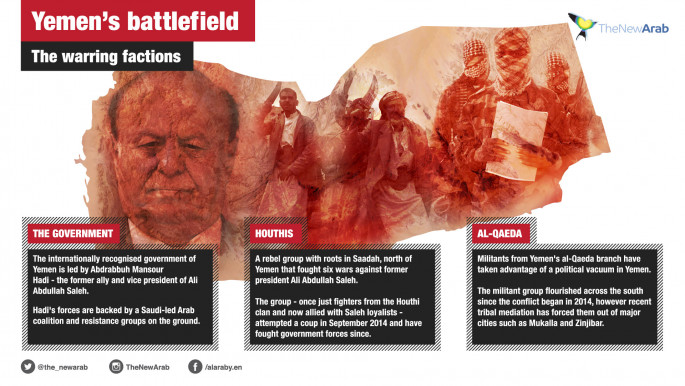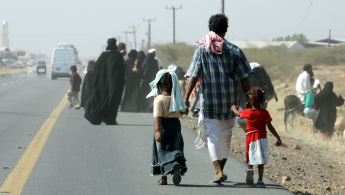Displaced Yemenis languish in camps
The cornfield is dotted with tents, mud-brick shelters and huts made of sticks and plastic sheets, home to around 900 Yemenis who fled the front-lines of their country's war. Buried in the field's soil are the bodies of loved ones they carried with them as they escaped.
Around 30 miles to the north near the border with Saudi Arabia, their hometown Haradh lies emptied of people and largely destroyed by fighting as Yemeni rebels and Saudi forces bombard each other with rockets and missiles across the frontier.
"I am still in disbelief," said Moussa al-Shibani, a farmer now living in the cornfield, known as al-Makhzan camp. "I was stable in my land, my town, among my family. I never thought to leave. My home is a piece of me."
Al-Makhzan camp, located on Yemen's western coastal plain below towering desert mountains, is just one small corner of misery in the humanitarian crisis that has overwhelmed this country.
More than three million of the country's 26 million people have been driven from their homes; entire towns have been wiped out under airstrikes; other cities have come under crippling sieges and hunger has become widespread.
 |
More than three million of the country's 26 million people have been driven from their homes; entire towns have been wiped out under airstrikes; other cities have come under crippling sieges and hunger has become widespread |  |
The Saudi-led coalition of Arab states has been conducting airstrikes in Yemen since March 2015, supporting the exiled government of Abedrabbo Mansour Hadi, against the Houthis who are reportedly backed by Iran and pledge allegiance to former president Ali Abdullah Saleh. More than 4,000 civilians have been killed.
 |
|
Haradh had once been relatively prosperous, benefiting from cross-border trade and smuggling.
Now the main street is lined with levelled buildings, according to footage aired on Yemeni TV. Most residents – some 11,500 families – fled in the summer of 2015, scattering to various nearby areas.
Some came to the field outside the town of Abs, and its owner let them set up shacks, which has since grown into al-Makhzan camp.
Leila, a grandmother with a traditional tattoo on her forehead, said her home was flattened in an airstrike. As her family fled, they carried with them the bodies of two of her children and a friend killed in the strike. They are now buried in the field.
"We're worth nothing, not even the palm of a hand," she said, using a local expression that means a tiny amount.
In al-Makhzan, barefoot children roam the field. The men are jobless. There are no medical facilities. The closest hospital was in Abs, a half-hour drive away. Few could afford the car fare for that. Then in August an airstrike destroyed the Abs hospital, so now the nearest medical facility is even farther, three hours away.
Several elderly people over 80 years bedridden in their shacks said they are just waiting to die, too weak to seek help for ailments.
 |
Several elderly people over 80 years bedridden in their shacks said they are just waiting to die, too weak to seek help for ailments |  |
Every three months, aid from UN agencies arrives. The residents need everything but most of all, food, said al-Shibani, who now acts as an aid coordinator. Many are living on just bread and tea.
Al-Shibani left the Haradh area with his and his brothers' families after an airstrike hit a gas station next to his house. He later returned to take care of his sheep and a plot of land where he grew vegetables.
He found the whole area deserted, his land littered with munitions and cluster bombs.
"I was the only one left," he said. "There is nothing but a battlefield." Rebel fighters told him it was better for him to leave.
 |
Yahia Gaber's four daughters have suffered psychological trauma from the bombings. His daughter Beshayer, nearly 15, bites people, tears her hair and slaps her own face |  |
Motta Ali Arfag built a mud-brick shelter with her own hands in al-Makhzan for her family – her parents, husband and three children. Her brother lives nearby in a shack with his family.
Now Arfag is four months pregnant with another child.
"I don't want children anymore ... not at a time of war," she said. Her kids become terrified and unable to sleep when warplanes fly overhead.
Yahia Gaber's four daughters have suffered psychological trauma from the bombings. His daughter Beshayer, nearly 15, bites people, tears her hair and slaps her own face.
Doctors told them there's nothing that could be done, Gaber said, adding his own explanation: "They have been struck by devils."



